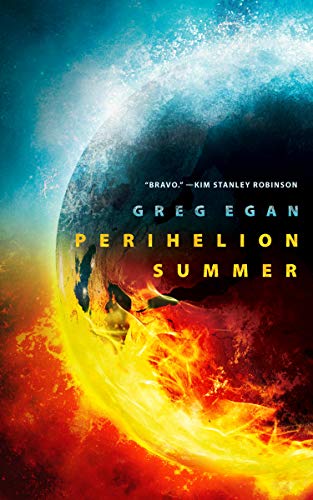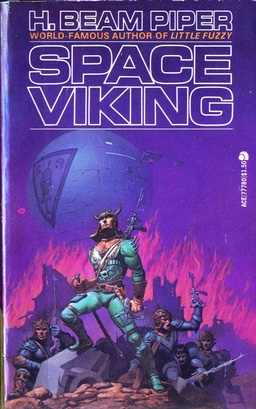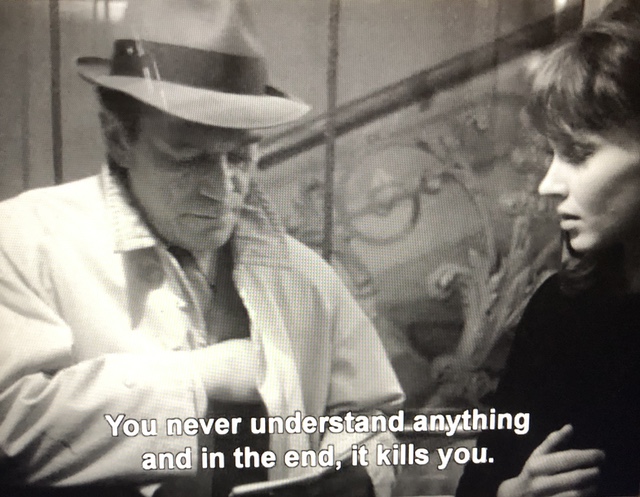As I noted in Alphaville, Appleseed covers similar ground. Been a few years, so I rewatched it.
But back up a bit to the manga. Shirow Masamune's first manga was Black Magic, about a computer-controlled society of animal-people on a habitable Venus, 60 million years ago when the Earth is full of dangerous dinosaurs, and a powerful young sorceress and her friends who hang out at the Onimal bar fighting the AI throughout the solar system. Rogue AI death machines (in that case cute little "M-66" infiltration/assassination robots) are released, death and mayhem ensue, civilization falls because people lazily give up control to the machines. It's a fantastic book, but too silly at times for the message he wanted to send. There is an "M-66 Black Magic" anime about just the robots but set on modern Earth, incredibly dumb though it does have some T&A which young Mark enjoyed.
Appleseed's 4-volume manga is a reboot of similar ideas, set after nuclear war, with an artificial city controlled by an AI "Gaia", populated by bioroids (in the manga, they go into detail about just how artificial they are; the older ones are more machine than biological and tied directly into Gaia) as servants to a fraction of Humanity. But servants with power don't remain servants. Athena, city administrator biodroid, is torn between wanting to get rid of the Humans entirely, and fulfilling the original mission of the city; and ultimately she's just a tool of Gaia. Wasteland survivors have been brought into the city and haven't really been domesticated, but are trying to make the city work. And terrorists want to tear down the system.
The 1988 movie covers the first volume, sort of, and a bit of the others, and doesn't use the appleseed of the title. There's been a bunch of remakes, but the original's the only one that addresses the moral issues at all. The first two CGI films (Appleseed (2004) and Appleseed Ex Machina (2007)) are unspeakably bad action flicks with preposterous mega-boob physics and cartoon blowjob-doll face for Deunan (who is not so endowed in the manga or anime), and while I haven't seen the reboot CGI flick Appleseed Alpha (2014), it's a "prequel" which has nothing to do with the manga. There's also a TV series Appleseed XIII (2013) which is more action flicks about WOO DEUNAN SHOOT GUNS.
I wouldn't classify any of these exactly as "cyberpunk", because they're not about the street finding new uses for the military-industrial complex's technology; they're about the military-industrial complex. Hard SF, and in the original with a political axe to grind against AI.
I plan to reread Ghost in the Shell's 3 volumes of manga as well, and then I'll comment on the competent but over-simplified 1995 movie and the other junk around that franchise, which follows a similar pattern.
So, read comic books for big ideas, kids, don't look at fucking moving pictures. But I'll talk about the moving picture anyway.
Obviously, this is peak '80s. Like more '80s than the '80s were. Big hair, shoulder pads in women's suits, pastel colors, neon, sleek but sharp vehicles instead of little melted blobs, battlesuits that look like perfect Japanese motorcycles instead of piles of scrap metal held together with hot glue. The music is new wave and smooth jazz, what the Kids Today™ call "synthwave" but this is real, not synthetic, synth music. Cel animation is expensive and backgrounds are pretty static, there's none of this bullshit of using 3D CGI with light cel shading to pretend you're drawing something, no, Human animators toiled over every frame. If you don't like the '80s aesthetic, get the fuck out, you're not welcome here.
Cop Karon and artist Freya ("Fleia") are soon separated by her suicide, from feeling as trapped in a gilded cage as their pet birds, and as we see later in the film, the city's bioroid administration does not respond with kindness and care, but with clinical research on the survivor.
Cute but deadly Deunan (possibly modeled on Markie Post) and cyborg smoothy Briareus (Richard Roundtree in a cyborg bunny face?) are in ESWAT, cleaning up the messes normal cops can't, and a cyborg terrorist getting away and killing a few of their buddies gets them motivated to investigate, though on-screen that largely consists of them wearing trenchcoats, busting down doors, and body-bagging potential informants.
Hitomi, a bioroid who rescued the main characters and many more Humans from the wasteland and acts as their social worker, gets back into the city, in what might be my favorite view of any city: She wakes on a helicopter reflected in solar panels, rushes to the other side to see the city in light. It's only a momentary shot, but makes me think the city might not be so bad. Hitomi's the heart of the manga, and the anime tries its best, with limited screen time. The party at the Onimal bar (a relic from the Black Magic manga) is the only time her faux-Human relations really come up: She loves all her rescued strays, and her would-be boyfriend/pathetic stalker isn't really enough for that love.
The bioroids as machines isn't touched on much in the anime; those other than Hitomi are shown only as drones or would-be tyrants like Athena, and they're DNA-edited and grown in tanks, but just how much of a replaceable part most of them are isn't brought up until Athena tries to decide who lives and who dies.
The Human Liberation Front terrorists do eventually discuss their motives and objectives, to get hold of a giant spider-tank which is the prototype for a fleet of spider-tanks to be directly operated by Gaia; then Humanity will be totally cut off from power. But to get it, they have to lock out Gaia, and there's a key for that. A failsafe which, very deliberately, only Human sympathizers can use.
The action scenes in this aren't Gundam quality, and they're not bloody like many later versions, but they're fine for telling the story. The couple of times the terrorists fight up close brings home just how deadly Landmates (mecha) are in close combat and as mobile infantry/artillery. I'm not sure the "BAN LANDMATES" graffiti is ever visible in the anime, but it's constant in the manga, and kind of an in-joke for old anime fans. While the anime has cyborgs with various levels of replacement, there's no robots, which are a major element of the manga, as a thing even lower than bioroids but also threatening to replace Humanity.
Where this falls down is the final sequence inside Gaia; they have maybe 10 minutes to squeeze in half a volume of arguments and action. In the manga, this is a place where Deunan has to make a moral decision which will change the course of Human history: Free will and endless wars, or inhuman tyranny, or is there a third path? Here, it's just resetting a machine, and what the machines think of that isn't discussed.
★★★★☆, it'd be 5 if they'd ever adapted the rest of the manga, but nobody seems interested in making movies with political philosophy against AI control, I wonder why.


